Psychiatric Mental Health Nursing (40)
Principles
-
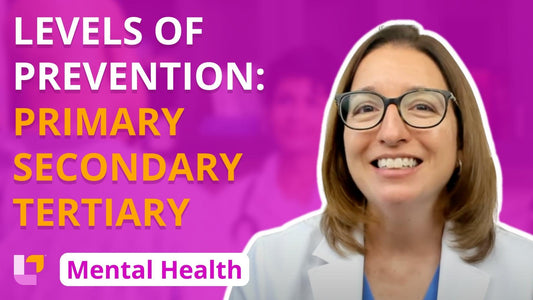
Psychiatric Mental Health, part 12: Principles - Primary, Secondary, Tertiary Prevention of Mental Health Disorders
Cathy Parkes RN, BSN, PHN, CWCNLearn all about the primary, secondary, and tertiary prevention of mental health disorders in the community.
21 commentsPsychiatric Mental Health, part 12: Principles - Primary, Secondary, Tertiary Prevention of Mental Health Disorders
Cathy Parkes RN, BSN, PHN, CWCNLearn all about the primary, secondary, and tertiary prevention of mental health disorders in the community.
21 comments -
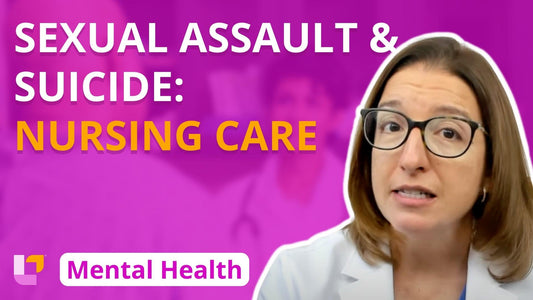
Psychiatric Mental Health, part 11: Principles - Sexual Assault and Suicidal Patients
Cathy Parkes RN, BSN, PHN, CWCNContent warning: Sexual assault and suicide. This video covers key nursing knowledge about sexual assault victims and suicidal patients. The labs, treatment, and nursing care for victims of sexual assault....
Psychiatric Mental Health, part 11: Principles - Sexual Assault and Suicidal Patients
Cathy Parkes RN, BSN, PHN, CWCNContent warning: Sexual assault and suicide. This video covers key nursing knowledge about sexual assault victims and suicidal patients. The labs, treatment, and nursing care for victims of sexual assault....
-
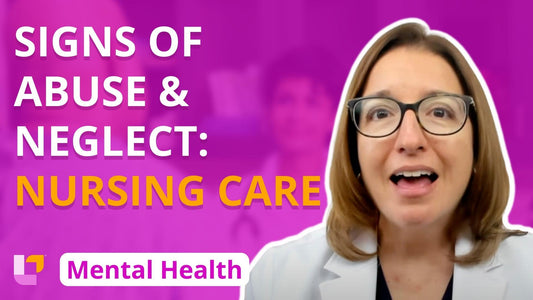
Psychiatric Mental Health, part 10: Principles - Abuse: Principles - Signs of Abuse, Nursing Care
Cathy Parkes RN, BSN, PHN, CWCNIn this video, we continue our coverage of abuse: signs of physical, emotional abuse, sexual abuse, and neglect. Important nursing care interventions for abuse situations.
Psychiatric Mental Health, part 10: Principles - Abuse: Principles - Signs of Abuse, Nursing Care
Cathy Parkes RN, BSN, PHN, CWCNIn this video, we continue our coverage of abuse: signs of physical, emotional abuse, sexual abuse, and neglect. Important nursing care interventions for abuse situations.
-
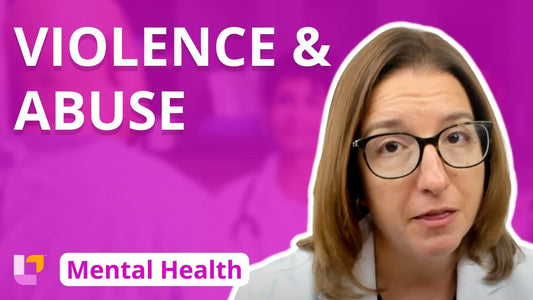
Psychiatric Mental Health, part 9: Principles - Aggression/Violence, Abuse
Cathy Parkes RN, BSN, PHN, CWCNLearn about violence and aggression: predictors of violence, deescalation techniques, and interventions for violent behavior. Overview of abuse: abuse types (physical, emotional, sexual, neglect, and economic abuse), followed by the...
Psychiatric Mental Health, part 9: Principles - Aggression/Violence, Abuse
Cathy Parkes RN, BSN, PHN, CWCNLearn about violence and aggression: predictors of violence, deescalation techniques, and interventions for violent behavior. Overview of abuse: abuse types (physical, emotional, sexual, neglect, and economic abuse), followed by the...
-
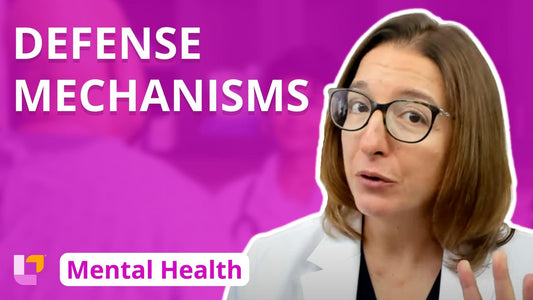
Psychiatric Mental Health, part 8: Principles - Defense Mechanisms
Cathy Parkes RN, BSN, PHN, CWCNDefense mechanisms, including: avoidance, compensation, conversion, denial, displacement, dissociation, identification, intellectualization, projection, rationalization, reaction formation, regression, repression, splitting, sublimation, suppression, and undoing. Includes a video quiz!
5 commentsPsychiatric Mental Health, part 8: Principles - Defense Mechanisms
Cathy Parkes RN, BSN, PHN, CWCNDefense mechanisms, including: avoidance, compensation, conversion, denial, displacement, dissociation, identification, intellectualization, projection, rationalization, reaction formation, regression, repression, splitting, sublimation, suppression, and undoing. Includes a video quiz!
5 comments -
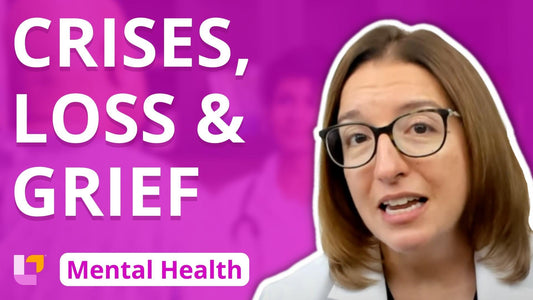
Psychiatric Mental Health, part 7: Principles - Crises, Loss, and Grief
Cathy Parkes RN, BSN, PHN, CWCNThe types of crises (maturational, situational, adventitious) and nursing care of patients during a crisis. The difference between an actual loss vs. a perceived loss. The stages of grief (denial,...
1 commentPsychiatric Mental Health, part 7: Principles - Crises, Loss, and Grief
Cathy Parkes RN, BSN, PHN, CWCNThe types of crises (maturational, situational, adventitious) and nursing care of patients during a crisis. The difference between an actual loss vs. a perceived loss. The stages of grief (denial,...
1 comment -

Psychiatric Mental Health, part 6: Principles - Stress and General Adaptation Syndrome, Anxiety
Cathy Parkes RN, BSN, PHN, CWCNThe stages of General Adaptation Syndrome: alarm reaction stage, resistance stage, and exhaustion stage. The characteristics and symptoms of mild, moderate, severe, and panic-level anxiety. The nursing care of patients...
Psychiatric Mental Health, part 6: Principles - Stress and General Adaptation Syndrome, Anxiety
Cathy Parkes RN, BSN, PHN, CWCNThe stages of General Adaptation Syndrome: alarm reaction stage, resistance stage, and exhaustion stage. The characteristics and symptoms of mild, moderate, severe, and panic-level anxiety. The nursing care of patients...
-
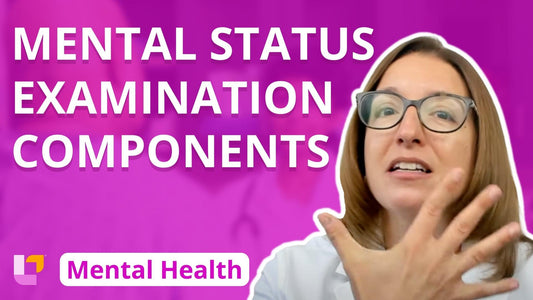
Psychiatric Mental Health, part 5: Principles - Mental Status Examination
Cathy Parkes RN, BSN, PHN, CWCNThe key components of a mental status examination: Appearance, Behavior, Motor Activity, Speech, Mood/Affect, Thought Process/Content, Perception, Cognition, Insight, and Judgement. Includes a video quiz!
1 commentPsychiatric Mental Health, part 5: Principles - Mental Status Examination
Cathy Parkes RN, BSN, PHN, CWCNThe key components of a mental status examination: Appearance, Behavior, Motor Activity, Speech, Mood/Affect, Thought Process/Content, Perception, Cognition, Insight, and Judgement. Includes a video quiz!
1 comment -
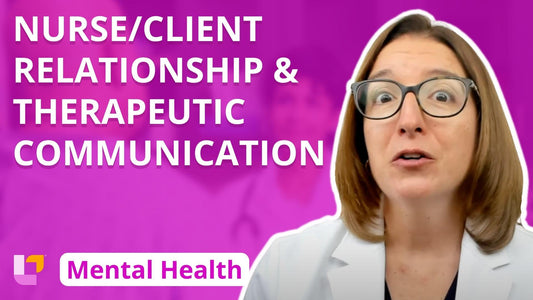
Psychiatric Mental Health, part 4: Principles - Nurse/Client Relationship, Therapeutic Communication
Cathy Parkes RN, BSN, PHN, CWCNPhases of the Nurse/Client Relationship (pre-orientation, orientation, working, termination), the concepts of transference and countertransference. Therapeutic communication techniques and non-therapeutic communication techniques.
2 commentsPsychiatric Mental Health, part 4: Principles - Nurse/Client Relationship, Therapeutic Communication
Cathy Parkes RN, BSN, PHN, CWCNPhases of the Nurse/Client Relationship (pre-orientation, orientation, working, termination), the concepts of transference and countertransference. Therapeutic communication techniques and non-therapeutic communication techniques.
2 comments -
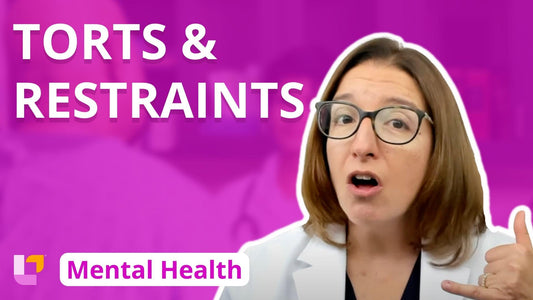
Psychiatric Mental Health, part 3: Principles - Torts and Restraints
Cathy Parkes RN, BSN, PHN, CWCNIntentional torts, including: assault, battery, false imprisonment, invasion of privacy, and defamation of character. Unintentional torts, including negligence and malpractice. Restraints and seclusion, include indications for restraints, types of restraints,...
Psychiatric Mental Health, part 3: Principles - Torts and Restraints
Cathy Parkes RN, BSN, PHN, CWCNIntentional torts, including: assault, battery, false imprisonment, invasion of privacy, and defamation of character. Unintentional torts, including negligence and malpractice. Restraints and seclusion, include indications for restraints, types of restraints,...
-
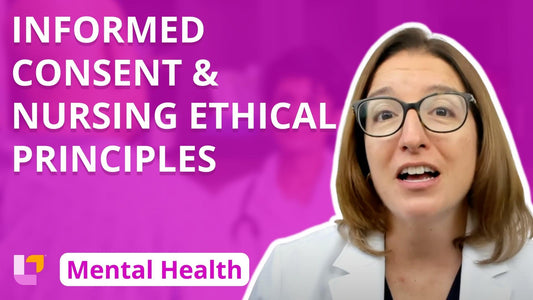
Psychiatric Mental Health, part 2: Principles - Informed Consent, Ethical Principles
Cathy Parkes RN, BSN, PHN, CWCNLearn about Informed Consent, including the provider's and nurse's responsibilities with Informed Consent. Who IS and ISN'T competent to provide informed consent. A review of nursing ethical principles, including: autonomy,...
Psychiatric Mental Health, part 2: Principles - Informed Consent, Ethical Principles
Cathy Parkes RN, BSN, PHN, CWCNLearn about Informed Consent, including the provider's and nurse's responsibilities with Informed Consent. Who IS and ISN'T competent to provide informed consent. A review of nursing ethical principles, including: autonomy,...
-
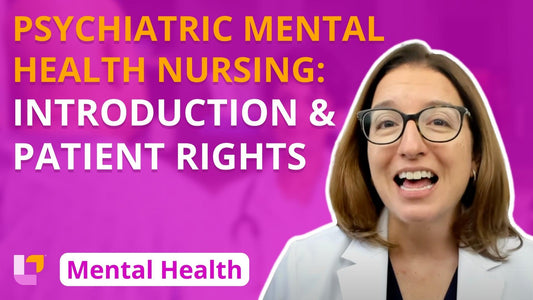
Psychiatric Mental Health, part 1: Principles - Introduction, Patient Rights
Cathy Parkes RN, BSN, PHN, CWCNAn introduction to our Psychiatric Mental Health Nursing video series. Learn PMH principles, starting with types of admissions/commitments (voluntary admission, involuntary commitment, emergency commitment) and patient rights (patient confidentiality, right...
1 commentPsychiatric Mental Health, part 1: Principles - Introduction, Patient Rights
Cathy Parkes RN, BSN, PHN, CWCNAn introduction to our Psychiatric Mental Health Nursing video series. Learn PMH principles, starting with types of admissions/commitments (voluntary admission, involuntary commitment, emergency commitment) and patient rights (patient confidentiality, right...
1 comment
Therapies
-
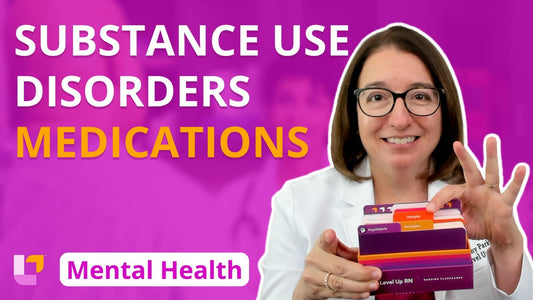
Psychiatric Mental Health, part 25: Therapies - Medications for Substance Use Disorders
Cathy Parkes RN, BSN, PHN, CWCNMedications used for substance use disorders, including alcohol use disorder (disulfiram, naltrexone, acamprosate) and opioid use disorder (buprenorphine, methadone). Medications that support smoking cessation (varenicline, buproprion).
Psychiatric Mental Health, part 25: Therapies - Medications for Substance Use Disorders
Cathy Parkes RN, BSN, PHN, CWCNMedications used for substance use disorders, including alcohol use disorder (disulfiram, naltrexone, acamprosate) and opioid use disorder (buprenorphine, methadone). Medications that support smoking cessation (varenicline, buproprion).
-
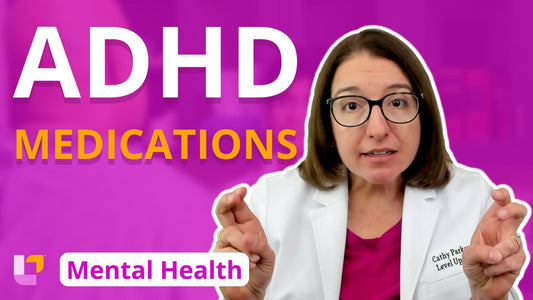
Psychiatric Mental Health, part 24: Therapies - ADHD Medications
Cathy Parkes RN, BSN, PHN, CWCNCentral Nervous System stimulations, which are used to treat ADHD (Attention Deficit Hyperactivity Disorder). Key medications within this class, side effects, nursing care, and patient teaching for ADHD medications.
Psychiatric Mental Health, part 24: Therapies - ADHD Medications
Cathy Parkes RN, BSN, PHN, CWCNCentral Nervous System stimulations, which are used to treat ADHD (Attention Deficit Hyperactivity Disorder). Key medications within this class, side effects, nursing care, and patient teaching for ADHD medications.
-
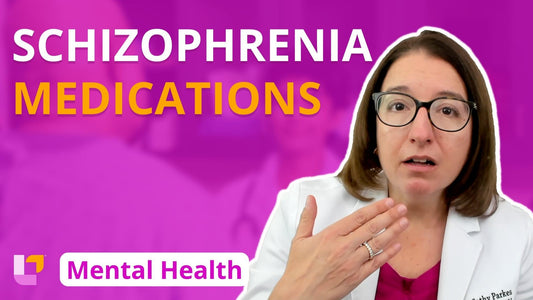
Psychiatric Mental Health, part 23: Therapies - Medications for Schizophrenia
Cathy Parkes RN, BSN, PHN, CWCNAntipsychotic medications used in the treatment of schizophrenia, including first generation (typical) and second generation (atypical) antipsychotics. The side effects and nursing care for each medication class. Two important antipsychotic...
Psychiatric Mental Health, part 23: Therapies - Medications for Schizophrenia
Cathy Parkes RN, BSN, PHN, CWCNAntipsychotic medications used in the treatment of schizophrenia, including first generation (typical) and second generation (atypical) antipsychotics. The side effects and nursing care for each medication class. Two important antipsychotic...
-
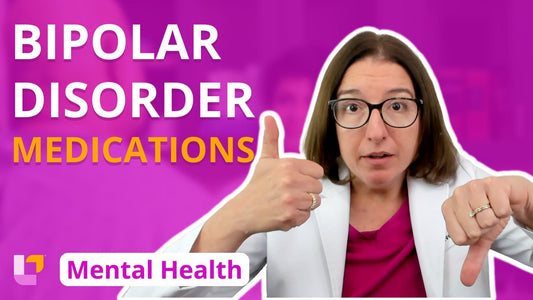
Psychiatric Mental Health, part 22: Therapies - Bipolar Disorder Medications
Cathy Parkes RN, BSN, PHN, CWCNKey medications used in the treatment of bipolar disorder, including lithium, carbamazepine, and valproic acid. For lithium, the side effects, contraindications, signs/symptoms of toxicity, interactions, nursing care, and patient teaching...
Psychiatric Mental Health, part 22: Therapies - Bipolar Disorder Medications
Cathy Parkes RN, BSN, PHN, CWCNKey medications used in the treatment of bipolar disorder, including lithium, carbamazepine, and valproic acid. For lithium, the side effects, contraindications, signs/symptoms of toxicity, interactions, nursing care, and patient teaching...
-
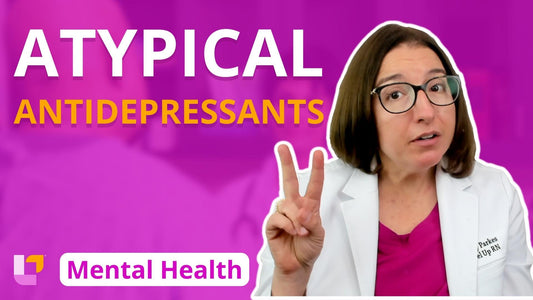
Psychiatric Mental Health, part 21: Therapies - Atypical Antidepressants
Cathy Parkes RN, BSN, PHN, CWCNTwo key atypical antidepressants, bupropion and trazodone. The indications, mode of action, and side effects associated with these medications.
Psychiatric Mental Health, part 21: Therapies - Atypical Antidepressants
Cathy Parkes RN, BSN, PHN, CWCNTwo key atypical antidepressants, bupropion and trazodone. The indications, mode of action, and side effects associated with these medications.
-
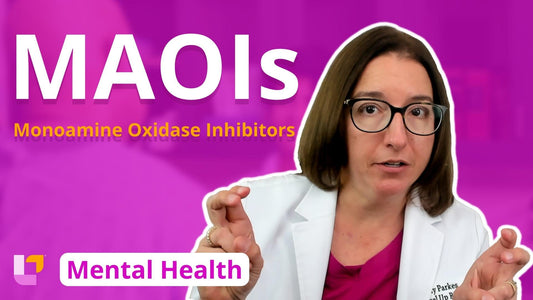
Psychiatric Mental Health, part 20: Therapies - MAOIs Monoamine Oxidase Inhibitors
Cathy Parkes RN, BSN, PHN, CWCNMonoamine oxidase inhibitors (i.e., MAOIs), including: phenelzine, tranylcypromine, isocarboxazid, and selegiline. The mode of action, key side effects, interactions, and patient teaching associated with MAOIs.
Psychiatric Mental Health, part 20: Therapies - MAOIs Monoamine Oxidase Inhibitors
Cathy Parkes RN, BSN, PHN, CWCNMonoamine oxidase inhibitors (i.e., MAOIs), including: phenelzine, tranylcypromine, isocarboxazid, and selegiline. The mode of action, key side effects, interactions, and patient teaching associated with MAOIs.
-

Psychiatric Mental Health, part 19: Therapies - Tricyclic Antidepressants
Cathy Parkes RN, BSN, PHN, CWCNTricyclic antidepressants, including amitriptyline and imipramine. The indications, mode of action, side effects, and patient teaching associated with this medication class.
Psychiatric Mental Health, part 19: Therapies - Tricyclic Antidepressants
Cathy Parkes RN, BSN, PHN, CWCNTricyclic antidepressants, including amitriptyline and imipramine. The indications, mode of action, side effects, and patient teaching associated with this medication class.
-
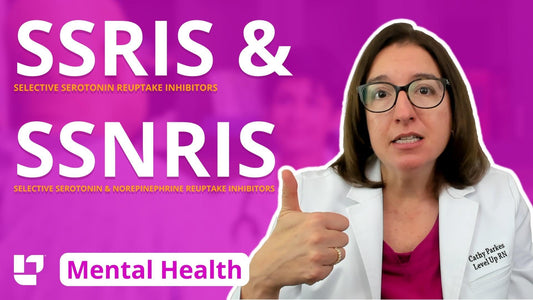
Psychiatric Mental Health, part 18: Therapies - SSRIs & SSNRIs
Cathy Parkes RN, BSN, PHN, CWCNSelective Serotonin Reuptake Inhibitors (SSRIs) and Selective Serotonin and Norepinephrine Reuptake Inhibitors (SSNRIs). Key medications that fall within these drug classes. The mode of action, interactions, and important side effects...
Psychiatric Mental Health, part 18: Therapies - SSRIs & SSNRIs
Cathy Parkes RN, BSN, PHN, CWCNSelective Serotonin Reuptake Inhibitors (SSRIs) and Selective Serotonin and Norepinephrine Reuptake Inhibitors (SSNRIs). Key medications that fall within these drug classes. The mode of action, interactions, and important side effects...
-
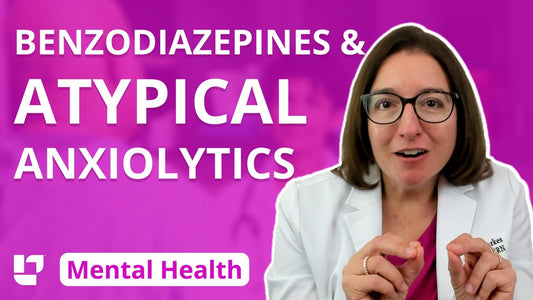
Psychiatric Mental Health, part 17: Therapies - Benzodiazepines & Atypical Anxiolytics
Cathy Parkes RN, BSN, PHN, CWCNKey medications used to treat anxiety, including benzodiazepines (diazepam, lorazepam, midazolam, alprazolam, chlordiazepoxide) and atypical anxiolytics (buspirone). The mode of action, side effects, and important teaching regarding medications in these...
Psychiatric Mental Health, part 17: Therapies - Benzodiazepines & Atypical Anxiolytics
Cathy Parkes RN, BSN, PHN, CWCNKey medications used to treat anxiety, including benzodiazepines (diazepam, lorazepam, midazolam, alprazolam, chlordiazepoxide) and atypical anxiolytics (buspirone). The mode of action, side effects, and important teaching regarding medications in these...
-
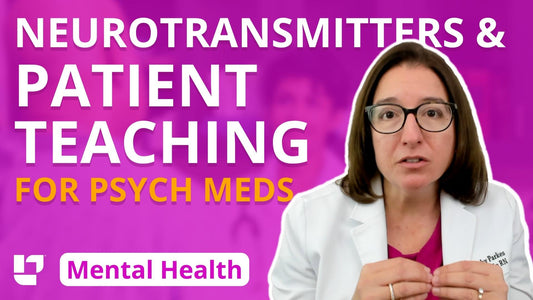
Psychiatric Mental Health, part 16: Therapies - Neurotransmitters & Patient Teaching for Psych Meds
Cathy Parkes RN, BSN, PHN, CWCNFour key neurotransmitters that are commonly affected by mental health medications, including: GABA, serotonin, norepinephrine, and dopamine. Key teaching that should be provided a patient who is prescribed a psychiatric...
Psychiatric Mental Health, part 16: Therapies - Neurotransmitters & Patient Teaching for Psych Meds
Cathy Parkes RN, BSN, PHN, CWCNFour key neurotransmitters that are commonly affected by mental health medications, including: GABA, serotonin, norepinephrine, and dopamine. Key teaching that should be provided a patient who is prescribed a psychiatric...
-
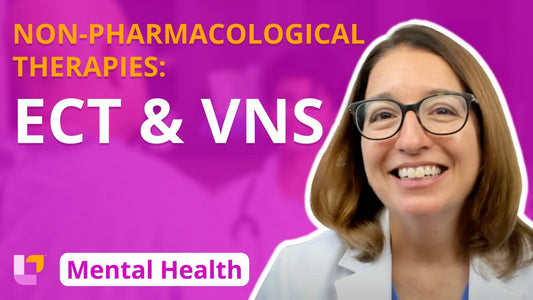
Psychiatric Mental Health, part 15: Therapies - ECT, VNS
Cathy Parkes RN, BSN, PHN, CWCNOverviews of Electroconvulsive Therapy (ECT) and Vagus Nerve Stimulation (VNS). ECT includes the indications, contraindications, medications used during the procedure, side effects, nursing care and patient teaching. For VNS, we...
Psychiatric Mental Health, part 15: Therapies - ECT, VNS
Cathy Parkes RN, BSN, PHN, CWCNOverviews of Electroconvulsive Therapy (ECT) and Vagus Nerve Stimulation (VNS). ECT includes the indications, contraindications, medications used during the procedure, side effects, nursing care and patient teaching. For VNS, we...
-
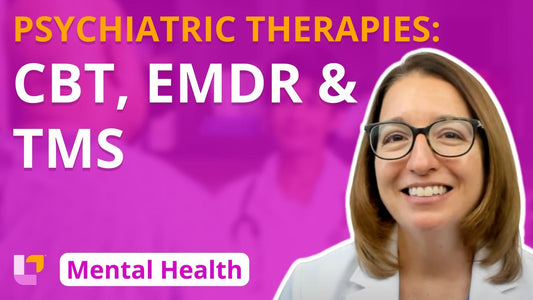
Psychiatric Mental Health, part 14: Therapies - CBT, EMDR, TMS
Cathy Parkes RN, BSN, PHN, CWCNOverviews of Cognitive Behavioral Therapy (CBT), Dialectical Behavioral Therapy (DBT), Eye Movement Desensitization and Reprocessing (EMDR), and Transcranial Magnetic Stimulation (TMS).
Psychiatric Mental Health, part 14: Therapies - CBT, EMDR, TMS
Cathy Parkes RN, BSN, PHN, CWCNOverviews of Cognitive Behavioral Therapy (CBT), Dialectical Behavioral Therapy (DBT), Eye Movement Desensitization and Reprocessing (EMDR), and Transcranial Magnetic Stimulation (TMS).
-

Psychiatric Mental Health, part 13: Therapies - Relaxation, Milieu, Group, and Behavioral
Cathy Parkes RN, BSN, PHN, CWCNIntroduction to therapies for mental health disorders. Relaxation techniques, including progressive relaxation, biofeedback, guided imagery, and meditation. The concept of milieu therapy, along with the purpose and phases of group...
1 commentPsychiatric Mental Health, part 13: Therapies - Relaxation, Milieu, Group, and Behavioral
Cathy Parkes RN, BSN, PHN, CWCNIntroduction to therapies for mental health disorders. Relaxation techniques, including progressive relaxation, biofeedback, guided imagery, and meditation. The concept of milieu therapy, along with the purpose and phases of group...
1 comment
Disorders
-
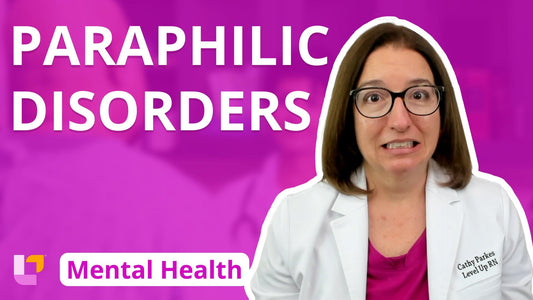
Psychiatric Mental Health, part 40: Disorders - Paraphilic Disorders
Cathy Parkes RN, BSN, PHN, CWCNThe difference between paraphilia and paraphilic disorders. Some of the main paraphilic disorders, including: exhibitionism, voyeurism, fetishism, frotteurism, sexual sadism, sexual masochism, and pedophilia.
Psychiatric Mental Health, part 40: Disorders - Paraphilic Disorders
Cathy Parkes RN, BSN, PHN, CWCNThe difference between paraphilia and paraphilic disorders. Some of the main paraphilic disorders, including: exhibitionism, voyeurism, fetishism, frotteurism, sexual sadism, sexual masochism, and pedophilia.
-
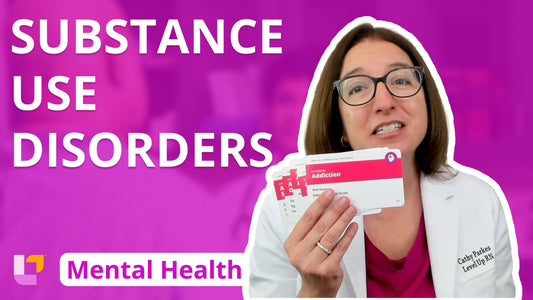
Psychiatric Mental Health, part 39: Disorders - Substance Use Disorders
Cathy Parkes RN, BSN, PHN, CWCNAddiction and substance use disorders. Important terminology regarding addiction, including: intoxication, tolerance, dependence, and withdrawal. Alcohol use disorder, including the signs and symptoms of intoxication, signs and symptoms of withdrawal,...
Psychiatric Mental Health, part 39: Disorders - Substance Use Disorders
Cathy Parkes RN, BSN, PHN, CWCNAddiction and substance use disorders. Important terminology regarding addiction, including: intoxication, tolerance, dependence, and withdrawal. Alcohol use disorder, including the signs and symptoms of intoxication, signs and symptoms of withdrawal,...
-
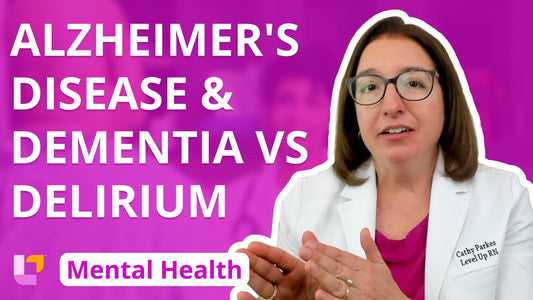
Psychiatric Mental Health, part 38: Disorders - Alzheimer's Disease & Dementia vs. Delirium
Cathy Parkes RN, BSN, PHN, CWCNAlzheimer's disease and reviews the differences between dementia and delirium. The symptoms of early-stage, moderate-stage, and late-stage Alzheimer's disease, along with other symptoms associated with dementia, such as confabulation, preservation,...
Psychiatric Mental Health, part 38: Disorders - Alzheimer's Disease & Dementia vs. Delirium
Cathy Parkes RN, BSN, PHN, CWCNAlzheimer's disease and reviews the differences between dementia and delirium. The symptoms of early-stage, moderate-stage, and late-stage Alzheimer's disease, along with other symptoms associated with dementia, such as confabulation, preservation,...
-
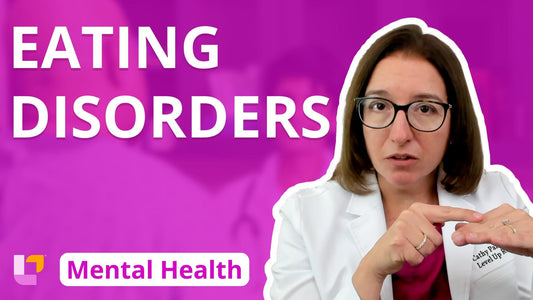
Psychiatric Mental Health, part 37: Disorders - Eating Disorders
Cathy Parkes RN, BSN, PHN, CWCNBulimia nervosa and anorexia nervosa: Signs, symptoms, hospitalization criteria, treatment, and nursing care. Binge eating disorder: common signs/symptoms, treatment, and nursing care.
Psychiatric Mental Health, part 37: Disorders - Eating Disorders
Cathy Parkes RN, BSN, PHN, CWCNBulimia nervosa and anorexia nervosa: Signs, symptoms, hospitalization criteria, treatment, and nursing care. Binge eating disorder: common signs/symptoms, treatment, and nursing care.
-
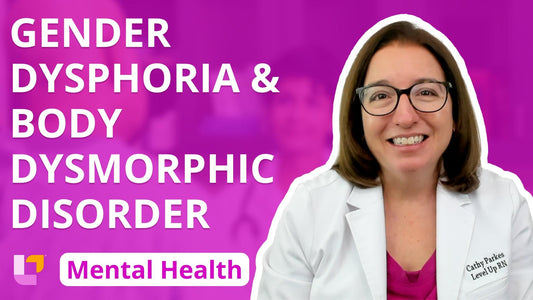
Psychiatric Mental Health, part 36: Disorders - Gender Dysphoria & Body Dysmorphic Disorder
Cathy Parkes RN, BSN, PHN, CWCNGender dysphoria and body dysmorphic disorder. What gender dysphoria is and symptoms of gender dysphoria. Diagnosis, treatment, and nursing care of patients with gender dysphoria. What body dysmorphic disorder is,...
Psychiatric Mental Health, part 36: Disorders - Gender Dysphoria & Body Dysmorphic Disorder
Cathy Parkes RN, BSN, PHN, CWCNGender dysphoria and body dysmorphic disorder. What gender dysphoria is and symptoms of gender dysphoria. Diagnosis, treatment, and nursing care of patients with gender dysphoria. What body dysmorphic disorder is,...
-
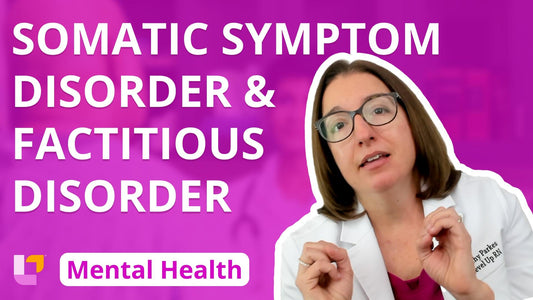
Psychiatric Mental Health, part 35: Disorders - Somatic Symptom Disorder and Factitious Disorder
Cathy Parkes RN, BSN, PHN, CWCNSomatic symptom disorder, including the risk factors, symptoms, treatment, and nursing care of patients with this disorder. Factitious disorder (i.e., Munchausen syndrome). The difference between factitious disorder and malingering. The...
Psychiatric Mental Health, part 35: Disorders - Somatic Symptom Disorder and Factitious Disorder
Cathy Parkes RN, BSN, PHN, CWCNSomatic symptom disorder, including the risk factors, symptoms, treatment, and nursing care of patients with this disorder. Factitious disorder (i.e., Munchausen syndrome). The difference between factitious disorder and malingering. The...
-
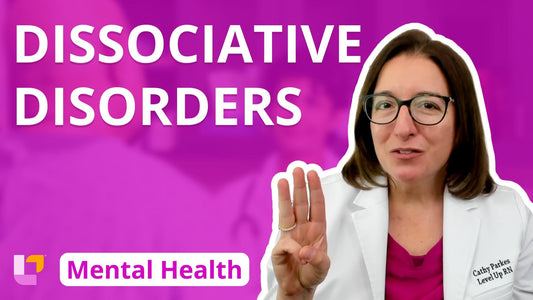
Psychiatric Mental Health, part 34: Disorders - Dissociative Disorders
Cathy Parkes RN, BSN, PHN, CWCNDissociative disorders, including: dissociative amnesia, depersonalization disorder, and dissociative identity disorder. Risk factors, diagnosis, treatment, and nursing care of patients with dissociative disorders.
Psychiatric Mental Health, part 34: Disorders - Dissociative Disorders
Cathy Parkes RN, BSN, PHN, CWCNDissociative disorders, including: dissociative amnesia, depersonalization disorder, and dissociative identity disorder. Risk factors, diagnosis, treatment, and nursing care of patients with dissociative disorders.
-
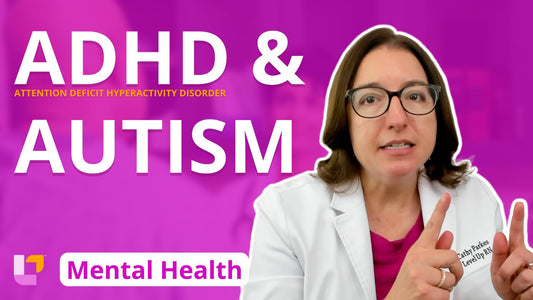
Psychiatric Mental Health, part 33: Disorders - ADHD & Autism
Cathy Parkes RN, BSN, PHN, CWCNAttention Deficit Hyperactivity Disorder (ADHD) and Autism. The symptoms, diagnosis, treatment, and family teaching associated with ADHD. The risk factors, symptoms, diagnosis, treatment, and family teaching associated with autism.
Psychiatric Mental Health, part 33: Disorders - ADHD & Autism
Cathy Parkes RN, BSN, PHN, CWCNAttention Deficit Hyperactivity Disorder (ADHD) and Autism. The symptoms, diagnosis, treatment, and family teaching associated with ADHD. The risk factors, symptoms, diagnosis, treatment, and family teaching associated with autism.
-
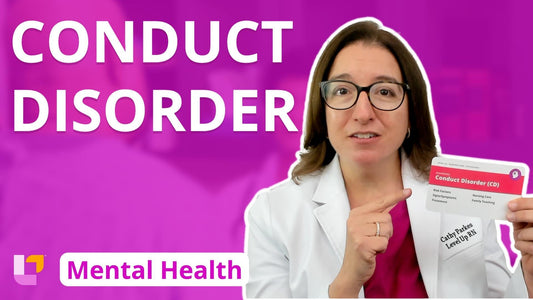
Psychiatric Mental Health, part 32: Disorders - Conduct Disorder
Cathy Parkes RN, BSN, PHN, CWCNConduct disorder and oppositional defiant disorder. The characteristics of each disorder, risk factors associated with conduct disorder, and treatment of conduct disorder.
Psychiatric Mental Health, part 32: Disorders - Conduct Disorder
Cathy Parkes RN, BSN, PHN, CWCNConduct disorder and oppositional defiant disorder. The characteristics of each disorder, risk factors associated with conduct disorder, and treatment of conduct disorder.
-
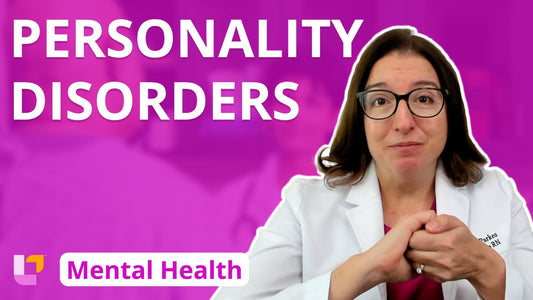
Psychiatric Mental Health, part 31: Disorders - Personality Disorders
Cathy Parkes RN, BSN, PHN, CWCNPersonality disorders including: paranoid, schizoid, schizotypal, antisocial, borderline, histrionic, narcissistic, avoidant, dependent, & obsessive-compulsive
1 commentPsychiatric Mental Health, part 31: Disorders - Personality Disorders
Cathy Parkes RN, BSN, PHN, CWCNPersonality disorders including: paranoid, schizoid, schizotypal, antisocial, borderline, histrionic, narcissistic, avoidant, dependent, & obsessive-compulsive
1 comment -
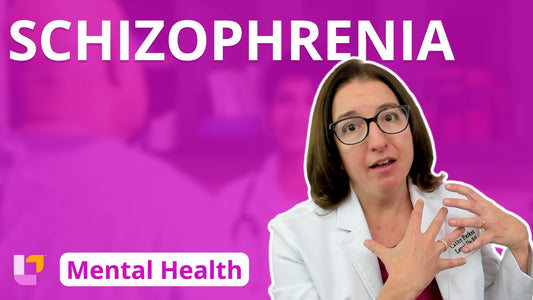
Psychiatric Mental Health, part 30: Disorders - Schizophrenia
Cathy Parkes RN, BSN, PHN, CWCNSchizophrenia. Positive and symptoms associated with schizophrenia (i.e., delusions, hallucinations, altered speech patterns), along with the negative symptoms associated with schizophrenia. Detailed explanation of disorganized speech associated with schizophrenia, including:...
Psychiatric Mental Health, part 30: Disorders - Schizophrenia
Cathy Parkes RN, BSN, PHN, CWCNSchizophrenia. Positive and symptoms associated with schizophrenia (i.e., delusions, hallucinations, altered speech patterns), along with the negative symptoms associated with schizophrenia. Detailed explanation of disorganized speech associated with schizophrenia, including:...
-
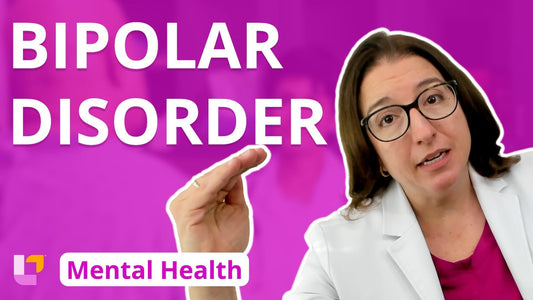
Psychiatric Mental Health, part 29: Disorders - Bipolar Disorder
Cathy Parkes RN, BSN, PHN, CWCNBipolar Disorder. Types of bipolar, symptoms of mania and depression, treatment of bipolar disorder, and nursing care of patients with bipolar disorder.
Psychiatric Mental Health, part 29: Disorders - Bipolar Disorder
Cathy Parkes RN, BSN, PHN, CWCNBipolar Disorder. Types of bipolar, symptoms of mania and depression, treatment of bipolar disorder, and nursing care of patients with bipolar disorder.
-
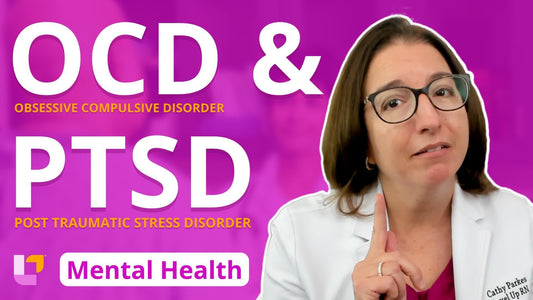
Psychiatric Mental Health, part 28: Disorders - OCD & PTSD
Cathy Parkes RN, BSN, PHN, CWCNObsessive Compulsive Disorder (OCD). Obsessions and compulsions, diagnosis of OCD, treatment of OCD, and nursing care of patients with OCD. Post Traumatic Stress Disorder (PTSD). Risk factors, signs/symptoms, diagnosis, treatment,...
Psychiatric Mental Health, part 28: Disorders - OCD & PTSD
Cathy Parkes RN, BSN, PHN, CWCNObsessive Compulsive Disorder (OCD). Obsessions and compulsions, diagnosis of OCD, treatment of OCD, and nursing care of patients with OCD. Post Traumatic Stress Disorder (PTSD). Risk factors, signs/symptoms, diagnosis, treatment,...
-
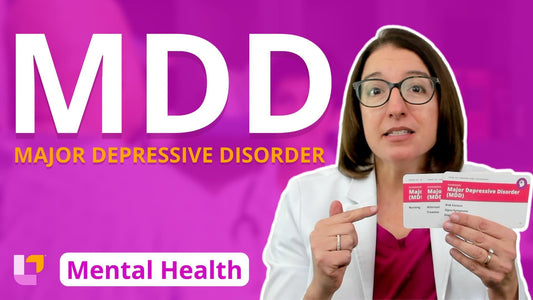
Psychiatric Mental Health, part 27: Disorders - Major Depressive Disorder
Cathy Parkes RN, BSN, PHN, CWCNMajor depressive disorder (MDD). The risk factors, symptoms, diagnosis, treatment, and nursing care for a patient with depression. Other depressive disorders, including: persistent depressive disorder, premenstrual dysphoric disorder, and seasonal...
Psychiatric Mental Health, part 27: Disorders - Major Depressive Disorder
Cathy Parkes RN, BSN, PHN, CWCNMajor depressive disorder (MDD). The risk factors, symptoms, diagnosis, treatment, and nursing care for a patient with depression. Other depressive disorders, including: persistent depressive disorder, premenstrual dysphoric disorder, and seasonal...
-
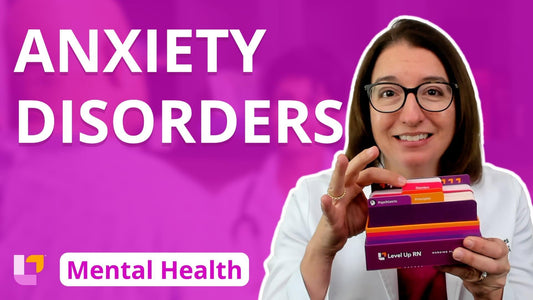
Psychiatric Mental Health, part 26: Disorders - Anxiety Disorders
Cathy Parkes RN, BSN, PHN, CWCNGeneralized Anxiety Disorder (GAD). Symptoms, diagnosis, treatment, and nursing care of generalized anxiety disorder. Specific anxiety disorders, including social anxiety disorder and agoraphobia.
Psychiatric Mental Health, part 26: Disorders - Anxiety Disorders
Cathy Parkes RN, BSN, PHN, CWCNGeneralized Anxiety Disorder (GAD). Symptoms, diagnosis, treatment, and nursing care of generalized anxiety disorder. Specific anxiety disorders, including social anxiety disorder and agoraphobia.








































